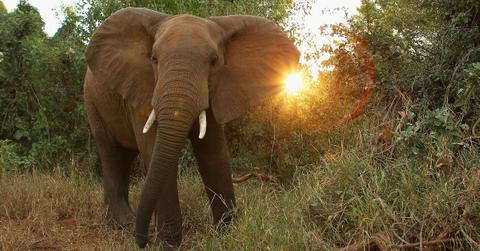Elephant Hunting Is Now Legal in Botswana, After Five-Year Ban
Botswana will issue 400 elephant hunting licenses every year.
Updated May 24 2019, 12:10 p.m. ET

Lawmakers in Botswana must have missed the new Dumbo movie.
Elephant hunting has been illegal in the Southern African country since 2014. But on Wednesday, May 24, to the dismay of animal activists and environmentalists, Botswana's government changed its tune and lifted the ban. Elephant hunting will once again be legal in Botswana.
As the New York Times reported, Botswana's Ministry of Environment, Natural Resources Conservation and Tourism announced that the ban was ending with a letter to the media, which the ministry shared to Facebook on Wednesday. "Following extensive consultations with all stakeholders, the Government of Botswana has taken a decision to lift the hunting suspension," the letter reads. Botswana's government followed up with a Twitter thread on Thursday, May 23, adding that fewer than 400 elephant hunting licenses will be granted each year.
The topic of elephant hunting has been controversial in Botswana over the past five years. According to CNN, Botswana first instituted the ban in 2014 because the elephant population was suffering from poaching and shrinking habitats. However, as the outlet noted, Botswana's elephant population has significantly increased since elephant hunting became illegal five years ago.
According to Conservation Action Trust, in 2016, the Great Elephant Census found 130,451 elephants in Botswana — the most of any African country. Some lawmakers believe that Botswana actually has too many elephants now. The ministry explained in the letter that during the Cabinet Sub Committee on Hunting Ban's discussions on this matter, some people argued that elephants presented a threat to humans and livestock (though, as CNN suggested, most people killed by elephants are those who are intruding in elephant habitats); that the hunting suspension negatively impacted communities that benefited from elephant hunting's profits before the ban began in 2014; and that "the general consensus from those consulted was that the hunting ban should be lifted."
"The Ministry would like to reiterate that it will work with all stakeholders to ensure that re-instatement of hunting is done in an orderly and ethical manner, and in accordance with the Wildlife Conservation and National Parks Act and the Wildlife Conservation and National Parks (Hunting and Licensing) Regulations," the letter adds. While the hunting may well be "orderly," the claim "ethical" is a bit confusing. How — and why — does one ethically kill someone who does not want to die?
When it comes to elephant hunting, it's rarely done out of personal necessity — there's either trophy hunting, or there's poaching. Trophy hunting is a form of recreational hunting, typically with the intention of displaying the animal's head as decor. Then there's poaching, which is when poachers illegally kill elephants for their ivory tusks and for meat. (As if there weren't thousands of cruelty-free foods we could eat instead.)
Environmentalists from around the world criticized the ban this week. "If it is all about community and wildlife conflict, there are dozens and dozens of options that can be used before one hauls out the guns," Derick Joubert, a National Geographic explorer-in-residence and wildlife conservationist told CNN. "Many people would be willing to put up a lot of money and ideas to help communities before we resort to the killing of animals."
Elephants are beautiful animals who add so much value to the Earth, and it's heartbreaking that there will soon be less of them in Botswana.